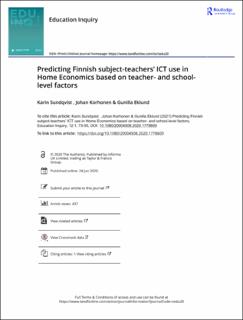Predicting Finnish subject-teachers’ ICT use in Home Economics based on teacher- and school-level factors
Peer reviewed, Journal article
Published version
Permanent lenke
https://hdl.handle.net/11250/2756345Utgivelsesdato
2020-06-24Metadata
Vis full innførselSamlinger
Originalversjon
Education Inquiry. 2020, 12 (1), 73-93). https://doi.org/10.1080/20004508.2020.1778609Sammendrag
This survey-based study (N = 161) investigates the direct and indirect effects of teacher- and school-level factors on subject-teachers’ use of ICT in Home Economics (HE). Structural equation modelling was used to test the hypothesised relationships between perceived usefulness of ICT in Home Economics, age, digital competence, ICT infrastructure, support and the three dimensions of ICT use: for cooperation, for facilitating pupils’ learning and for administration and lesson planning. Taking account of both direct and indirect effects, the main analysis reveals that the most important predictors of HE teachers’ ICT use are the teacher-level factors of digital competence, and perceived useful- ness of ICT in HE, as well as the school-level factor of support. The results also indicate a specific relationship between perceived useful- ness of ICT in HE and ICT use for facilitating pupils’ learning. Taken together, these findings highlight the relevance of teacher- and school-level factors in explaining the different dimensions of teachers’ ICT use. They further highlight the importance of providing HE tea- chers with the necessary support to develop their digital competence and increase their awareness of ICT’s potential value in enriching and supporting student learning in HE.

